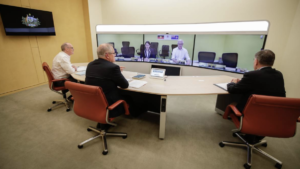Home » Commentary » Opinion » Nothing new under the sun in Morrison’s new federalism
· Canberra Times
 Prime Minister Scott Morrison has announced “a completely new system” of intergovernmental relations institutions, processes and agendas that will replace the Council of Australian Governments (COAG) and its various ministerial councils established in 1992.
Prime Minister Scott Morrison has announced “a completely new system” of intergovernmental relations institutions, processes and agendas that will replace the Council of Australian Governments (COAG) and its various ministerial councils established in 1992.
As part of these “new” arrangements, the national cabinet involving the Prime Minister and all state and territory leaders that operated during the pandemic will continue. Established as a temporary body to co-ordinate a national response to the COVID-19 pandemic, the national cabinet has been deemed a “more effective body for taking decisions in the national interest than COAG”.
There will also be a new body – the National Federation Reform Council – to “address new areas of reform”. The problem is, we do not know its membership or agenda, which is to be set by the national cabinet, and which is yet to be discussed, clarified, or announced.
The Prime Minister also stated there will be a “reset” (or rationalisation) of COAG’s current 12 intergovernmental ministerial councils. How this is to be done, and by what criteria, is unclear. This has the potential to cause adverse impacts on existing agreements and upset negotiations currently under way on new areas, thus delaying, not hastening, policy implementation.
It is not clear how the existing Council on Federal Financial Relations, composed of all of Australia’s treasurers and focusing on financial issues, is to take over responsibility for all national agreements currently operating under these existing ministerial councils, across a wide array of different policy areas. Treasurers may not be as “well placed” as the Prime Minister suggests to resolve the many complex issues in these agreements. This is a recipe for delay and confusion, not streamlined decision-making.
The Morrison government’s announcement looks too similar to the many previous attempts at intergovernmental relations reform.
There should be concerns, too, about continuing with the national cabinet given its failures during the pandemic to achieve a measure of national policy consensus – if that was its role. Some level of consistency among the states might have been desirable on a few key issues, such as school closures and reopenings, travel restrictions, border closures, the pace of restarting the economy, individual freedom and the employment of many Australians.
The idea of operating the future national cabinet “under federal cabinet rules”, including “the security of documents, process and procedure” – or as the Prime Minister put it, “like a fair dinkum cabinet” – must also be a concern. Indeed, it is currently unlike a cabinet operating under Westminster principles, with a lack of ministerial responsibility, accountability or cabinet solidarity as recent events highlight.
Continuation of the national cabinet, dominated as it is by federal, state and territory leaders, will further enhance the power of executive government in Australia, just as we have experienced during the pandemic. This will be to the detriment of parliaments, which will be unable to scrutinise agreements before they are signed, to parties, who cannot assure decisions align with their philosophy or their “mandates”, and to the people, with more decisions being made without community input. It will entrench even more the growing political and administrative power of each jurisdictional leader, to the detriment even of their own cabinets.
That the national cabinet, and the focus of the new bodies, “will be driven by an initial single agenda – to create jobs” does seem extraordinarily singular. Is that it?
And was not COAG doing the same job? It was established in 1992 as the “peak intergovernmental forum in Australia”, with almost the same members and same aims as the national cabinet: “to manage matters of national significance … that need co-ordinated action by all Australian governments.” Many worthwhile reforms were achieved. If, as the Prime Minister insinuates, COAG was where “good ideas went to die”, then the only ones to blame are the elected officials like him who attended.
The Morrison government’s announcement looks too similar to the many previous attempts at intergovernmental relations reform, which have been marked by institutional reorganisations, nomenclature changes of existing bodies and grand plans with little attempt at clarifying end goals. This makes it difficult at this stage to be too positive about its value.
Sufficient consideration does not appear to have been given to this reform and, compared to previous efforts, there has been a clear absence of adequate consultation. Federalism without consultation is always a mistake.
When the Bourbons retook the French throne in 1814 following the defeat of Napoleon, it was said “they have forgotten nothing and they have learned nothing”. It was more a case of old wine in still older bottles.
Morrison may have poured the old wine of federal-state intransigence and conflict into nice new freshly labelled bottles – the national cabinet and the National Federation Reform Council – but once we sip, it will all be the same.
And once the labels come off after some handling, we will see the bottles, too, are just the same as before.
Nothing new under the sun in Morrison’s new federalism